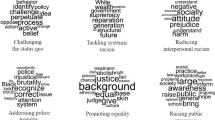Abstract
This chapter provides background on the antiwar movements against the 2003 US-led Iraq invasion in Australia, Canada, Great Britain, Northern Ireland, and the United States and considers the effect of the media on the public’s perception of protest activities. In addition, we briefly address the growing importance of technology on protest activity. Against this backdrop, we analyze qualitative responses provided by participants from these nations to two items from the Personal and Institutional Rights to Aggression and Peace Scale (PAIRTAPS; Malley-Morrison, Daskalopoulos, & You International Psychology Reporter 10:19–20, 2006). Using a grounded theory approach, responses were coded into major themes and subcategories, and frequencies were generated to summarize the pattern of responses across categories for each item. We conducted exploratory analyses to assess whether major themes and subcategories varied as a function of demographic and background characteristics. The majority of participants supported the right of individuals to protest, and categories did vary as a function of some personal characteristics. This chapter concludes with a discussion of the results and links them back to the initial literature review.
C. Davis (Retired)
Access this chapter
Tax calculation will be finalised at checkout
Purchases are for personal use only
Similar content being viewed by others
References
Bandura, A. (1999). Moral disengagement in the perpetration of inhumanities. Personality and Social Psychology Review, 3, 193–209 [Special Issue on Evil and Violence].
Bandura, A., Barbaranelli, C., Caprara, G. V., & Pastorelli, C. (1996). Mechanisms of moral disengagement in the exercise of moral agency. Journal of Personality and Social Psychology, 71, 364–374.
Carty, V., & Onyett, J. (2006). Protest, cyberactivism and new social movements: The reemergence of the peace movement post 9/11. Social Movement Studies, 5(3), 229–249.
Corbin, J., & Srauss, A. (1990). Grounder theory research: Procedures, canons, and evaluative criteria. Qualitative Sociology, 13, 3–21.
Cotright, D. (2008). Peace: A history of movements and ideas. Cambridge, UK: Cambridge UP.
Cox, L. (2006). News from nowhere: The movement of movements in Ireland. In L. Connolly & N. Hourigan (Eds.). Social movements and Ireland. (pp. 210–229). New York & Manchester: Manchester University Press.
Dardis, F. E. (2006). Marginalization devices in US press coverage of Iraq War protest: A content analysis. Mass Communication and Society, 9(2), 117–135.
Di Cicco, D. T. (2010). The Public nuisance paradigm: Changes in media coverage of political protests since the late 1960s. Journalism & Mass Communication Quaterly, 87, 137–155.
Dimitrova, D. V. (2006). Episodic frames dominate early coverage of Iraq War in the NYTimes.com. Newspaper Research Journal, 27, 79–83.
Dvorak, P. (2005). Antiwar fervor fills the streets. Washington, DC: The Washington Post. September 25.
Gilgun, J. F. (2003). Deductive qualitative analysis and family theory building. Twin Cities: University of Minnesota.
Gillan, K., Pickerill, J., & Webster, F. (2008). Anti-war activism: New media and protest. Basingstoke: Palgrave McMillan.
Hackett, R. A., & Zhao, Y. (1994). Challenging a master narrative: Peace protest and opinion/editorial discourse in the US press during the Gulf war. Discourse and Society, 5(4), 509–541.
Hallin, D. (1986). The uncensored war: The media and Vietnam. Berkeley: University of California Press.
Heaney, M. T., & Rojas, F. (2006). The place of framing: Multiple audiences and antiwar protests near fort bragg. Qualitative Sociology, 29, 485–505.
Kellner, D. (2003). From 9/11 to terror war: Dangers of the bush legacy. Lanham, MD: Rowman and Littlefield.
Kellner, D., & Kahn, R. (2004). New media and internet activism: From the ‘Battle of Seattle’ to blogging. New media & Society, 16(1), 87–95. doi:10.1177/1461444804039908.
Lewis, J., Inthorn, S. & Wahl-Jorgensen, K. (2005) Citizens or Consumers? What the Media Tell us about Political Participation. Maidenhead: Open University Press.
Luther, A., & Miller, M. M. (2005). Framing of the 2003 US–Iraq war demonstrations: An analysis of news and partisan texts. Journalism and Mass Communication Quarterly, 82(1), 78–96.
Malley-Morrison, K., Daskalopoulos, M., & You, H. S. (2006). International perspectives on governmental aggression. International Psychology Reporter, 10(1), 19–20.
McFadden, R. D. (2004, August 30). Vast anti-Bush rally greets Republicans in New York. The New York Times, p. A1.
McLeod, D. M. (1995). Communicating deviance: The effects of television news coverage of social protest. Journal of Broadcasting and Electronic Media, 39(1), 4–19.
McLeod, D. M., & Detenber, B. H. (1999). Framing effects of television news coverage of social protest. Journal of Communication, 49(3), 3–23.
Meyer, D. S & Corrigall-Brown, C. (2005). Coalitions and political context: US. movements against wars in Iraq. Mobilization. 10(3). 327–344.
Murray, C., Parry, K., Robinson, P., & Goddard, P. (2008). Reporting dissent in wartime: British press, the anti-war movement and the 2003 Iraq war. European Journal of Communication, 23, 7. doi:10.1177/0267323107085836.
O’Connor, B., & Vucetic, S. (2010). Another Mars/Venus divide? Why Australia said “Yes” and Canada said “Non” to involvement in the 2003 Iraq war. Australian Journal of International Affairs, 64(5), 2010.
Stevenson, R. W. (2003). Threats and responses: The white house; Antiwar protests fail to sway Bush on plans for Iraq. available from (http://www.nytimes.com/2003/02/19/world/threats-responses-white-house-antiwar-protests-fail-sway-bush-plans-for-iraq.html?pagewanted=all&src=pm)
Van Laer, J., & Van Aelst, P. (2009). Cyber-protest and civil society: The internet and action repertoires of social movements. In Y. Jewkes & M. Yar (Eds.), Handbook on internet crime (pp. 230–254). Portland: Universia Press.
Author information
Authors and Affiliations
Corresponding author
Editor information
Editors and Affiliations
Rights and permissions
Copyright information
© 2013 Springer Science+Business Media New York
About this chapter
Cite this chapter
Mercurio, A. et al. (2013). Perspectives on Protest in Great Britain, Northern Ireland, Canada, the United States and Australia. In: Malley-Morrison, K., Mercurio, A., Twose, G. (eds) International Handbook of Peace and Reconciliation. Peace Psychology Book Series, vol 7. Springer, New York, NY. https://doi.org/10.1007/978-1-4614-5933-0_14
Download citation
DOI: https://doi.org/10.1007/978-1-4614-5933-0_14
Published:
Publisher Name: Springer, New York, NY
Print ISBN: 978-1-4614-5932-3
Online ISBN: 978-1-4614-5933-0
eBook Packages: Behavioral ScienceBehavioral Science and Psychology (R0)




